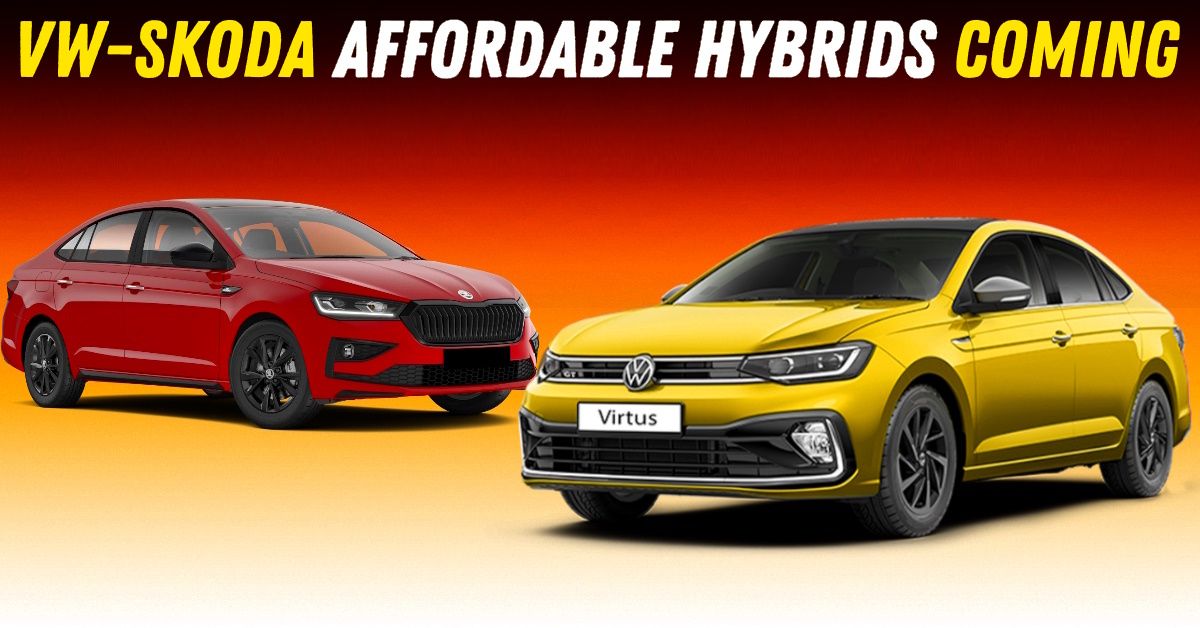Skoda-Volkswagen's Affordable Hybrids For India Likely By 2028


The Volkswagen Group has finally confirmed that hybrids are on the cards for India, with a likely launch timeline closer to 2028. Skoda Auto Volkswagen India is exploring strong hybrid options as part of its broader localisation plans, but unlike rivals, it’s taking a slow and cautious route. In an environment where Maruti, Toyota, and Honda are already building market share with petrol-electric models, the Group's delayed entry raises a critical question; will it be too little, too late?
At the core of the hybrid conversation is India’s policy uncertainty around future powertrain mix. While EV adoption is being incentivised in the short term, strong hybrids have seen steady traction due to their real-world fuel savings and lack of charging dependency. This middle path suits Indian usage patterns well, making hybrids the go-to solution for many city dwellers. Skoda-VW’s recognition of this trend comes later than most.
The confirmation of hybrid development has come from Piyush Arora, CEO of Skoda Auto Volkswagen India, who noted that powertrain diversification is now actively under review. That includes strong hybrids, which can run purely on electric power for short distances and rely on the internal combustion engine at higher loads.
The key hurdle, as always, is localisation. The Volkswagen Group wants to develop or adapt a hybrid system that can be cost-effective under Indian market constraints. This will likely require component sourcing from local suppliers, or establishing local manufacturing for hybrid-specific components like battery packs, e-motors, and power control units.
However, there are no clear indications of which platform will carry the hybrid system first. There’s speculation that the MQB-A0-IN platform, which underpins models like the Skoda Kushaq and Volkswagen Taigun, could be adapted. Alternatively, the next-gen Octavia or Superb could offer hybrid powertrains first, but that would be a more premium entry point.
By the time a Skoda or Volkswagen hybrid arrives in 2028, Maruti-Toyota’s alliance would have sold lakhs of hybrid vehicles through models like the Grand Vitara, Invicto, and Hyryder. Honda, despite struggling on volumes, has also built recall value with the City e:HEV.
This means Skoda-VW will not only need to match hybrid fuel efficiency, but also prove long-term reliability and service network readiness. Unlike EVs, which still face questions around charging infrastructure, strong hybrids face few consumer resistance points and are considered low-risk investments. The German group’s delay could force it to play catch-up in a segment that’s already maturing.
Despite being a late mover, Skoda and Volkswagen enjoy strong brand recall among urban, tech-savvy buyers. If they get the pricing and packaging right, a locally built hybrid Taigun or Slavia could still create ripples, particularly if bundled with German build quality and safety.
There’s also the angle of shared development. Globally, Volkswagen is pushing a new breed of plug-less hybrids under its MQB Evo architecture. If these tech stacks are adapted in time for India, the Group may leapfrog some of the tech investment costs. But the question is not just “can they build a hybrid”, it’s whether they can do it fast enough and cheap enough.
Skoda and Volkswagen’s hybrid ambitions are finally gaining clarity, but the 2028 timeline is fraught with risk. The strategy could work if India’s EV transition stays slow and hybrids remain the dominant fuel-saving tech. However, if infrastructure or regulations shift dramatically in favour of EVs before then, the Group may find itself stuck with a costly solution that missed the peak of its relevance. Timing, not just tech, will decide how well this gamble pays off.
Via ACI